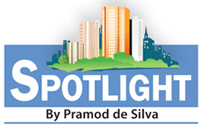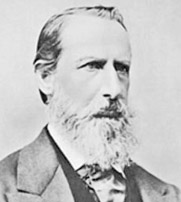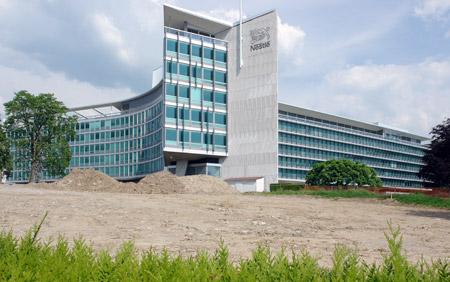Nestle: At 150 years, new frontiers key to growth
 Swiss-based
Nestle is one of the biggest food sector companies in the world. People
now consume more than one billion servings of Nestlé products per day.
The company operates in 200 countries and employs nearly 350,000 people.
It has 435 factories in 85 countries including Sri Lanka. Swiss-based
Nestle is one of the biggest food sector companies in the world. People
now consume more than one billion servings of Nestlé products per day.
The company operates in 200 countries and employs nearly 350,000 people.
It has 435 factories in 85 countries including Sri Lanka.
Nestlé, whose slogan is 'Good Food, Good Life' offers over 2,000
brands spread across seven basic product lines, with beverages being its
highest earner. Powdered and liquid beverages, water, milk products and
ice cream, cooked food, pet care and confectionery are among the
products.
The story of Nestle, which turns 150 years this year, is a
fascinating blend of invention, immigrant flair and resourcefulness.
Canned condensed milk, invented by Gail Borden in the early 1850s,
proved invaluable as a military ration in the 1860s. It became a very
successful product due to the lack of refrigeration at that time.
Page brothers
|

Founder of the company, German pharmacist Henri Nestlé
|
Hoping for similar success in Europe, US immigrant Charles Page
founded the Anglo-Swiss Condensed Milk Company in Cham, Switzerland, in
1866. His brother George was still in the US learning Gail Borden's
pioneering process for producing condensed milk. This involved heating
milk to evaporate some of the water, then adding sugar as a
preservative.
George and Charles Page, the American brothers and Nestlé forefathers
named their condensed milk 'Milkmaid'. High standards of quality and
safety, a modern factory, efficient distribution and savvy marketing
ensured the product was a success.
The brand that began Nestlé's 150-year history is still sold today as
Nestlé Milkmaid. "Ours is the original condensed Swiss milk and the
best. Every other kind is inferior," they boldly claimed.
A year later, Henri Nestlé, a German pharmacist who came over to
Switzerland, launched his Farine lactée - a combination of cow's milk,
wheat flour and sugar - in Vevey, Switzerland, saving the life of a
neighbour's child. People across the world soon began to recognise the
value of his life saving product, which led to a global company by 1872.
Around this time he started using the now iconic 'Bird's Nest' logo. The
Nestle name, of course, comes from him. To this day, Nestle is
headquartered in Vevey.
Merger
Following a two-decade long battle as fierce competitors, the
Anglo-Swiss Condensed Milk Company merged with Nestlé in 1905 to form
the leading nutrition, health and wellness company it is today. The
company introduced many new products over the years. By 1934, people
could enjoy a chocolate drink with Milo and by 1938 they could 'start
the day with a Nescafe', simply by adding hot water.
By 1948, they could enjoy Nesquik, a cocoa-based powder that
dissolves easily in cold milk. And by 1957, they could finish the day
with Maggi pasta 'ready meals' in cans.
Nestle has been active in Sri Lanka since 1906, just one year after
the merger. Naturally, Milkmaid was the first product imported to the
country and it is still a major product for Nestle in Sri Lanka. Nestle
became a public-quoted company in Sri Lanka in 1983 and launched
commercial production in 1984.
|

The Nestle headquarters in Vevey, Switzerland Pic: Courtesy Nestle |
Today, its local portfolio comprises several major Nestle brands
which are mostly produced locally at its state-of-the-art production
facility in Kurunegala.
Nestle manufactures over 90 percent of its products sold in Sri
Lanka. The company provides direct employment to almost 1,200 people and
indirectly benefits over 23,000 distributors, suppliers, farmers and
their families.
Among the other worldwide Nestle products are chocolates, coffee
creamer, infant formula, pet care products, ice cream, milk powder,
vegetarian cooked food, Italian food, cereals, whole grain breakfast,
ready food, infant cereal, bottled water and food drinks.
In the year ended December 31, 2015, Nestle worldwide profits
totalled 9,467 million Swiss francs (US$ 9,908 million), down from
14,904 million in 2014. Sales were 88,785 million Swiss francs
(US$92,923 million), down from 91,612 million.
Excluding gains from the 2014 sale of the company's stake in L'Oreal,
profits were up 6.5%, although the company has missed its sales-growth
target of 5% to 6% three years running. Nestle confirmed its full-year
outlook after first-quarter underlying sales growth of 3.9 per cent beat
expectations as accelerating volume growth made up for slower pricing.
As anticipated, the first quarter continued the positive momentum in
real internal growth, with softer pricing. "We gained market share in
the majority of our categories and businesses," the maker of Nescafe
instant coffee and Pure Life bottled water said in a statement.
"By being a Nestle shareholder, as well as investing in a company
capable of guaranteeing you a first-rate financial return, you are also
putting your faith in a company that is having a positive impact on
society and in its future," said chairman of Nestle S.A. Peter
Brabeck-Letmathe.
Brabeck-Letmathe who spoke on April 7 before an audience of 2,853
shareholders at the Nestle annual meeting in Lausanne.
Nestle is venturing into several new areas in food technology -
Nestlé SA scientists are untangling genetic profiles to develop medical
foods - one of the company's big hopes for sales growth. The Swiss food
company is tapping into an estimated $15 billion market for
prescription-based powders and drinks to meet specific nutritional
requirements to treat diseases. The scientists will develop medical
foods containing natural compounds extracted from foodstuffs such as
tomatoes, coffee and grapes.
Nestlé will expand research and innovation activities in Asia with
the setting up of the Nestlé Research Centre (NRC) Asia in Biopolis, the
biomedical research hub of Singapore. The expansion builds on Nestlé's
strategic innovation partnership with Singapore's Agency for Science,
Technology and Research (A*STAR), and provides a new base for Nestlé
Research Centre, with a focus on healthy aging.
Nestle also engages in many CSR and community uplift programs. For
example, the Nestlé Healthy Kids Global Program will be on-going in 80
countries to improve the nutrition, health and wellness of children
around the world.
Nestle has run into controversy with some of its food products in
several countries. In India, Maggi noodles were banned in June 2015 and
subjected to tests after concerns were expressed that they had excess
levels of lead and other harmful substances.
India's Central Food Technological Research Institute (CFTRI) last
week submitted analysis reports on Maggi Noodles to the country's
Supreme Court stating that lead levels for all samples are within
permissible limits. The CFTRI Mysuru laboratory furnished the reports
after testing 29 samples of Maggi Noodles not only for lead and MSG, but
also for other safety parameters such as metal contaminants, crop
contaminants and toxic substances. Nestle relaunched Maggi Noodles in
India on November 9, 2015, after fulfilling conditions set by the Bombay
High Court which lifted the ban.
Sri Lankan authorities also tested the locally manufactured noodles
which were found to be safe.
In the USA, Nestle initiated a voluntary recall of select food
products in March this year after finding glass pieces in certain
DiGiorno Pizza, Lean Cuisine and Stauffer's Lasagna products. "No
injuries have been reported," according to Nestle USA's press release.
"We are recalling these products because they may contain small pieces
of glass that may cause injury."
Next week: BMW
|

